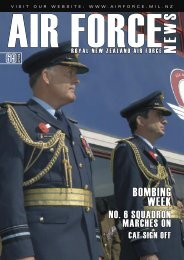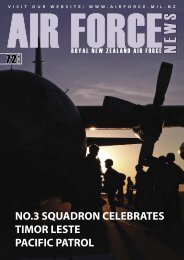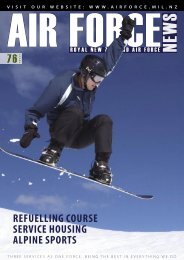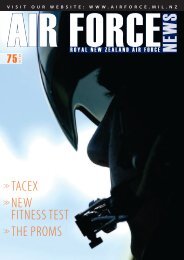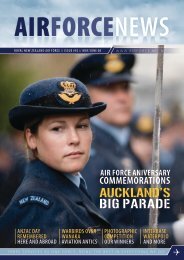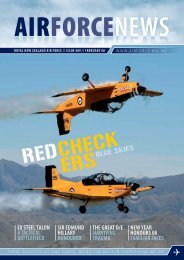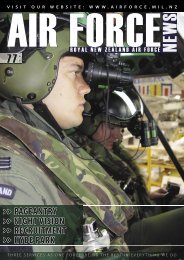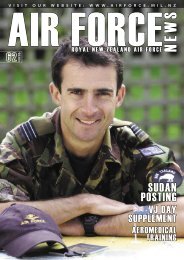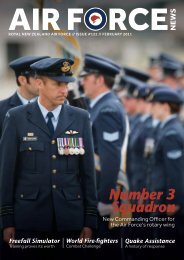June 2006, Issue 71 [pdf 2.8mb, 40 - Royal New Zealand Air Force
June 2006, Issue 71 [pdf 2.8mb, 40 - Royal New Zealand Air Force
June 2006, Issue 71 [pdf 2.8mb, 40 - Royal New Zealand Air Force
Create successful ePaper yourself
Turn your PDF publications into a flip-book with our unique Google optimized e-Paper software.
16<br />
To carry out AMEs, medics, doctors and nurses must complete the RNZAF<br />
AME course run by the Aviation Medicine Unit (AMU). The three-week course<br />
covers aviation physiology, considerations before fl ight, in fl ight monitoring<br />
and care, loading, preparing aircraft and equipment. This course is a tri-<br />
Service course and we also have civilian doctors and nurses who complete<br />
the course.<br />
In November 2004 OCAF signed off on the Boeing 757 AME capability. The<br />
Boeing 757 AME capability will be able to transport three High Dependency<br />
Patients (Intensive Care patients) and three Medium Dependency Patients<br />
(MDP), a total of six stretcher patients. No jet aircraft in the Asia Pacifi c<br />
region can currently carry that many stretcher patients at any one time. A<br />
757 AME work party was formed to see how this could be best achieved.<br />
The 757 AME work party are expecting delivery of the fi rst 757 AME<br />
prototype soon. This is a very exciting and major achievement for the<br />
RNZAF AME capability as it has been run down and neglected over the<br />
past 10 years.<br />
FORWARD AEROMEDICAL<br />
EVACUATIONS (FWD AME)<br />
Related to the AME capability but with more of a military focus, the Fwd<br />
AME is the movement of battlefi eld casualties, by helicopter, from a forward<br />
position rearward so they can receive life or limb surgery. The feedback for<br />
RNZAF medics who deployed to East Timor was they needed more specifi c<br />
training in this area. The new course was designed by the AMU and TDHQ<br />
in Woodbourne. A lot of data and information from East Timor was used to<br />
look at what areas medics needed to be up skilled in. The Fwd AME medics<br />
will complete a winchman’s course and HEUT training completed by No.3<br />
Squadron and then they have an intense medical phase to complete the<br />
course. This course is unique, as there is no other course of this type run in<br />
<strong>New</strong> <strong>Zealand</strong>. The course will be run at the AMU and is also a tri-service<br />
course allowing Army and Navy medics to complete it.<br />
The new Fwd AME course still covers things that were taught on the<br />
SAR medics course as supporting national SAR is still one of the RNZAF<br />
outputs. The Search and Rescue Medics course was designed in the<br />
1980’s to support the NZ Police in Search and Rescue. It was designed<br />
around injuries and conditions people might suffer from after being lost<br />
in the bush for a long period of time. Also back in those days there were<br />
no rescue helicopters to carry out this support so No.3 Squadron used to<br />
complete this role. The RNZAF still support the NZ Police in this role but<br />
on a less frequent basis. The new Fwd AME course will replace the old<br />
SAR medics course.<br />
AK 02-0434-07<br />
Sgt Mike Cocker and<br />
Major Linda Lampen-<br />
Smith on Fwd AME<br />
duties in East Timor.<br />
AK 02-0434-04<br />
Medical staff transport<br />
a seriously ill patient to<br />
an RNZAF aircraft to be<br />
evacuated back to NZ<br />
from an Island in the South<br />
Pacifi c for more specialist<br />
care and surgery.<br />
JOINING A DYNAMIC TEAM<br />
Medics are one of the fi rst people to be deployed in times of need. It could<br />
be disaster relief after a tidal wave, cyclone or earthquake or completing<br />
an AME of a seriously ill person out of the islands. The travel opportunities<br />
are endless both in <strong>New</strong> <strong>Zealand</strong> and overseas. Medics also deploy<br />
to numerous hot spots around the world and we currently have medics on<br />
deployment in Afghanistan. Other places medics have deployed to include<br />
Bougainville, East Timor, Solomon islands, and Iraq. It is very exciting and<br />
rewarding job and after nearly 20 years in the trade I still enjoy travelling<br />
and helping people. The rewards are written all over the peoples face<br />
who we help, even though they can’t communicate with you, a smile or<br />
the nod of the head is enough to make all worth while. I have numerous<br />
happy and sad experiences but I always feel like we make a difference.<br />
A lot of the places we deploy to have very basic medical care so I learnt<br />
very early on in my career you can only do so much. You have to be very<br />
multi skilled in the medicine to be a functional RNZAF Medic and very<br />
adaptable to changing situations.<br />
You must be able to work in very extreme conditions with limited equipment<br />
and supplies. I remember one night delivering a baby on a mud fl oor<br />
hut under torchlight, with my battery running out and wishing so much that<br />
the village had power. We managed to deliver the baby so it all worked out<br />
well in the end. Another time was when we assisted in the Bali bombings,<br />
we arrived about 3 days after the bombing and up lifted a lady who had<br />
massive burns from the blast. Her burns had not been dressed for three<br />
days and she had been given no pain relief at all, they ran out of pain relief<br />
very quickly. One of the fi rst things we did was take care of her pain and<br />
give here some fl uids, as she was very dehydrated. Then we fl ew her to<br />
Australia for specialized medical care in a burns unit and to see the look<br />
of joy and a big smile on her face when we where loading her into the<br />
ambulance in Australia was priceless. It made all the years of training and<br />
practicing for some thing that worth while.<br />
If you like a challenge and like to make a difference then being an Medic<br />
in the RNZAF is for you. The training is intense and takes about fi ve years<br />
to be fully trained but the benefi ts are huge.<br />
RNZAF Medics on a UN deployment to Iraq.<br />
The medics accompanied UN Chemical, Biological<br />
and Nuclear inspection teams on inspects after the<br />
fi rst Gulf War. The deployment AFN<strong>71</strong> JUNE was 06 for six months www.airforce.mil.nz<br />
and they lived in Baghdad during this time.<br />
AK 02-0434-11


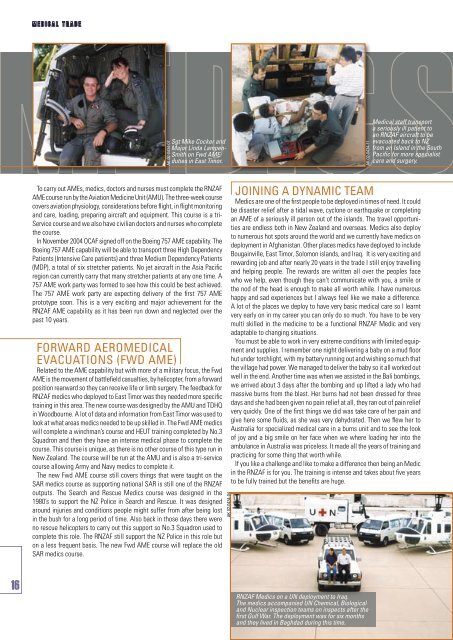
![February 2007, Issue 78 [pdf 3mb, 44 pages] - Royal New Zealand ...](https://img.yumpu.com/17485296/1/184x260/february-2007-issue-78-pdf-3mb-44-pages-royal-new-zealand-.jpg?quality=85)

